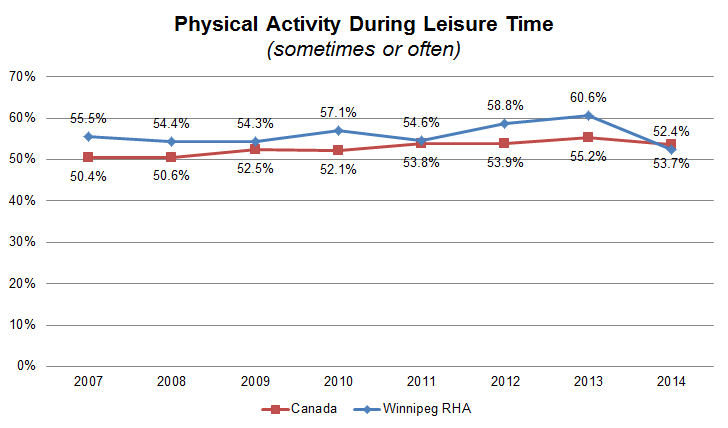Winnipeggers’ Physical Activity Dips Below National Average
The latest report from our Peg project reveals that 52.4 per cent of Winnipeggers are ‘sometimes’ or ‘often’ physically active during their leisure time—a figure lower than the national average of 53.7 per cent.
Summer is winding down and Winnipeggers are gearing up to go back to school and begin recreational programming for the fall. What does Peg tells us about how active Winnipeggers are compared to Canadians overall?
52.4 per cent of Winnipeggers are ‘sometimes’ or ‘often’ physically active during their leisure time—a figure lower than the national average of 53.7 per cent.
Peg tells us…
- In 2014, 52.4 per cent of Winnipeggers were sometimes or often physically active during their leisure time, down slightly from 54.3 per cent five years earlier.
- For the first time in almost ten years, fewer Winnipeggers were physically active in 2014 than the national average (52.4 per cent of Winnipeggers vs. 53.7 per cent of Canadians).

Why does this matter?
- Regular physical activity has many benefits. It helps growth and development, prevents chronic diseases, strengthens muscles, increases energy levels, decreases stress levels and helps keep people more independent as they age (PHAC, 2016).
Definitions:
- Respondents are classified as active, moderately active or inactive based on an index of average daily physical activity over the past 3 months.
- More detail and source data for the above facts available at: http://www.mypeg.ca/explorer/WellBeing/Health/Activeleisuretime/
Source of the data:
- Peg’s data for the Active Leisure Time indicator is provided by Statistics Canada.
Media inquiries:
For interviews on Peg, the data, or to be connected with organizations making a difference in the community, please contact:
Sumeep Bath, Media and Communications Officer
International Institute for Sustainable Development (IISD)
(204) 958-7700 ex. 740 | sbath@iisd.ca
About us:
Peg (mypeg.ca) is a community indicator system that measures the health of our community year over year – in ways that count. Peg is led by two partnering organizations – the International Institute of Sustainable Development (IISD) and United Way of Winnipeg (UW).
Regularly, the team at Peg releases data and facts that help us understand our city better. This is one of those regular reports. Others can be found at http://www.mypeg.ca/blog.
Peg is the starting place for Winnipeg citizens, educators, policy makers, and many others to learn more about our city so we can lead change to create a better city for our children and their children. At Peg we can all learn how our lives, our neighbourhood and our city is changing – for the good and the bad. Learn more at www.mypeg.ca.
About IISD
The International Institute for Sustainable Development (IISD) is an award-winning independent think tank working to accelerate solutions for a stable climate, sustainable resource management, and fair economies. Our work inspires better decisions and sparks meaningful action to help people and the planet thrive. We shine a light on what can be achieved when governments, businesses, non-profits, and communities come together. IISD’s staff of more than 250 experts come from across the globe and from many disciplines. With offices in Winnipeg, Geneva, Ottawa, and Toronto, our work affects lives in nearly 100 countries.
You might also be interested in
What Drives Investment Policy-makers in Developing Countries to Use Tax Incentives?
The article explores the reasons behind the use of tax incentives in developing countries to attract investment, examining the pressures, challenges, and alternative strategies that exist.
What Is the NAP Assessment at COP 29, and Why Does It Matter?
At the 29th UN Climate Change Conference (COP 29) in Baku, countries will assess their progress in formulating and implementing their National Adaptation Plans. IISD’s adaptation experts Orville Grey and Jeffrey Qi explain what that means, and what’s at stake.
What Will Happen at COP 29?
Talks at the 2024 UN Climate Change Conference (COP 29) will range from defining a way forward on finance through a new collective quantified goal (NCQG) to mitigation, and loss and damage. Ahead of negotiations in Baku, IISD’s Earth Negotiations Bulletin Team Lead Jennifer Bansard examines the agenda and breaks down what to watch as eyes turn to Azerbaijan.
IISD Annual Report 2023–2024
While IISD's reputation as a convenor, a trusted thought leader, and a go-to source on key issues within the sustainable development field is stronger than ever, the work happening outside the spotlight is just as valuable.